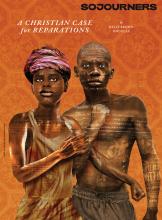IN MARCH , I made my first, and hopefully last, “panic-buy” of the pandemic: three survivalist books that look more like they belong in a nuclear bunker than on my bookshelves amid the theology, poetry, and knitting patterns. My purchases were, however, inspired by my reading Parable of the Sower and Parable of the Talents, classics by the science fiction literary giant Octavia E. Butler (1947-2006).
In these novels, Lauren Olamina—a young, disabled black girl—survives the apocalypse and helps rebuild society with her knowledge of edible wild plants, her sheer will and bravery, and her newfound religion, Earthseed. Lauren’s ability to adapt, to change, is her route through unimaginable suffering and the bedrock of her faith.
Originally published in 1993 and 1998, respectively, Butler’s Parable books were reissued last year, highlighting their current resonance. Sower introduces us to the United States in 2024, a dystopia ravaged by global warming, capitalism, and violence. Slavery, misogyny—the witch-burning kind—homelessness, and addiction are rampant. Lauren’s community is secure as long as the walls that surround it stand; as she rightly senses, walls are wont to crumble. She launches a backup plan that offers a hard hope within relentless loss. Talents continues Lauren’s, and her daughter Asha’s, journeys over the coming decades as the U.S. faces rising terrorist Christian nationalism and the election of an ultraconservative president who wants to “make America great again.”
Read the Full Article

